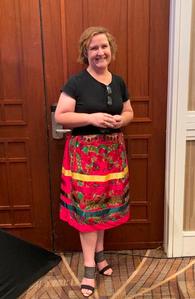 |
|
| Faith Harper | |
At the 10th Children's Institute, Faith Harper, author of Unf*ck Your Brain (Microcosm Publishing) and "bad-ass, funny lady with a PhD" led a session for booksellers about mental health and self-care.
"I'm not here to sell my books," Harper began, "I'm here to talk about the past two and a half years that we're not even done with yet." Harper said the ABA asked her to do a session that would focus on actual measures bookstore owners and staff (as well as just about everyone) can take to improve their current emotional and mental health. "My job," Harper said, is to "give you something practical that you can utilize in your everyday life and work because punching people is wrong. Unless you're in Texas."
A PowerPoint accompanied Harper's talk and the first slide broke the matter at hand down to its most specific definition: Stress is physiological. Stress is "how our body responds to life events with the appropriate output of resources." Basically, Harper said, referring back to the work of Kelly McGonigal in The Upside of Stress, "Things are stressful to us because they matter to us."
Burnout, Harper told the crowd, isn't simply one thing. The first stage of burnout is emotional exhaustion. This is "being emotionally overextended and depleted; overloaded and in conflict with everyone around us." This is the "individual stress" dimension of burnout. The second is cynicism: "When our responses to those around us become detached, cynical or negative. It develops a buffer against the constant experience of emotional exhaustion." Harper calls this the "interpersonal dimension." The final stage is reduced personal accomplishment: "This is our sense of not being as competent or accomplished in our tasks." Harper calls this the "self-evaluation dimension."
And so, Harper asked, what is the opposite of burnout? The answer is engagement, which looks like high energy, strong involvement and a sense of efficacy. Sure, she said, resilience training can be useful in helping individuals power through the low energy, cynicism, disinterest and lack of motivation. But that, Harper said, is where we need to rip the system apart. Because requiring individuals to do everything they can to simply become resilient in the face of very real problems puts the responsibility squarely on the person who is suffering with burnout.
What groups and individuals can do, Harper said, is heal burnout in connection. According to her research, experience and teaching, there are six relational domains of prevention and healing burnout: workload sustainability, control/autonomy, recognition/rewards, community/belonging, fairness/equity, values/ideals/motivation. The six domains together add up to engagement. Here, Harper pointed out, bookstore owners have a lot of room to help their staff: they can manage workloads; connect with employees to make sure they are being heard, recognized and rewarded; and make sure their workplace feels like a community with shared--or at least politely tolerated--values.
Harper gave out a few more excellent suggestions during the question/answer the q&a. One bookseller asked how to handle news burnout when customers come in and want to talk about the big news item of the day--even though it is the first time the customer is discussing the topic, the booksellers may have been forced to discuss it all day. Harper said to be "politely vague"--"Yeah, that's a lot." Period. End of sentence. Her husband, she said, "does 'blank stare don't care.' " A bookstore owner said they were excited to implement the six relational domains for their staff but asked how they could personally take Harper's ideas to help their own burnout. While it's harder for the owners and managers of the stores, Harper said there is still plenty they can do to fight their own burnout, starting with their own workload sustainability. Do they really need to go into work seven days a week? Does the events manager actually need them helping at the event? Certainly, owners may feel guilty taking steps back from day-to-day work, but through this process of creating engagement, they should, hopefully, feel confident in their staff--which will ultimately allow them to create a more comfortable and healthy work sustainability for themselves. There is also joy in working to build community, in making sure the business one owns is fair and equal, in rewarding staff for being their excellent selves. And there is absolutely nothing stopping owners from also rewarding themselves for being excellent. --Siân Gaetano, children's and YA editor, Shelf Awareness

